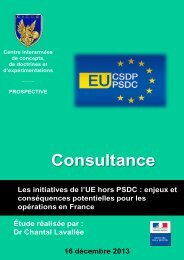Conference
science-research-bulletin-2013-conference
science-research-bulletin-2013-conference
You also want an ePaper? Increase the reach of your titles
YUMPU automatically turns print PDFs into web optimized ePapers that Google loves.
EUROPEAN POLICE SCIENCE AND RESEARCH BULLETIN<br />
SPECIAL CONFERENCE EDITION<br />
governed progression system tells us much about<br />
the importance that the police organisation and<br />
its members attach to the importance of ‘time<br />
serving’. The strict linear career model together<br />
with the continued importance it attaches to<br />
time served holds serious consequences for all<br />
officers but impacts in a particularly damning<br />
way for women. Whilst the police service may<br />
provide opportunities for part-time and flexible<br />
working (and can therefore demonstrate progress<br />
in the name of equality), senior policewomen<br />
interviewed by Silvestri (2003) remained sceptical<br />
of the possibility of engaging with such alternative<br />
working practices. Their narratives suggest a<br />
strong awareness that utilising alternative working<br />
patterns do not count towards the profile of<br />
earning or demonstrating either ‘credibility’ or<br />
‘commitment’ in the journey to the top. On the<br />
contrary, it is an ‘uninterrupted, long and full time<br />
career’ profile that counts in building an identity<br />
in police leadership. The ‘irresolvable conflict’ that<br />
exists between balancing family commitments<br />
and a career in policing remains a major barrier<br />
for women in policing with research continuing to<br />
stress that officers working part-time or flexibly are<br />
perceived as less professional and less committed,<br />
which in turn, affects the promotion aspirations<br />
and opportunities of policewomen (Charlesworth<br />
& Whittenbury, 2007; Dick & Cassell, 2002;<br />
Fischbach et al., 2013). Constructed as being ‘everavailable’<br />
and without family commitments, such<br />
an identity is justified through the conception of<br />
‘real’ policing and police work and it is here that<br />
the male identity of the ‘ideal’ officer is upheld,<br />
assured and preserved.<br />
CONCLUDING THOUGHTS<br />
The past century has been a mixed one for<br />
women working in policing. There have been<br />
a number of important and welcome changes<br />
in equalities policy and substantial inroads<br />
have been made to advancement and position<br />
of women in policing. At the same time, there<br />
is evidence of the considerable continuities,<br />
ingrained and enduring features of the masculine<br />
ethos that has shaped the police career over time<br />
and across place. Characterised by moments of<br />
progression and regression, gains and losses (often<br />
simultaneously felt) are an enduring theme of<br />
women’s experiences of policing over time. The<br />
history of struggle so often used to describe early<br />
policewomen’s experiences of policing is not<br />
confined to the past but rather can be seen in the<br />
present. Through the dominant mantra that ‘all<br />
things are equal now’ and the process of gender<br />
mainstreaming (and its association with progress),<br />
it is easy to fail to recognise the simultaneous<br />
‘undoing’ of gender and regression inherent<br />
in this process. It is true that policewomen in<br />
England & Wales no longer face or experience the<br />
visible and audible hostility of the past; they do,<br />
however, continue to experience the processes<br />
of gendered inclusion and exclusion — albeit<br />
in more subtle ways. Despite a discourse that<br />
suggests otherwise, the police career continues<br />
to be remarkably resilient to change.<br />
Women have now been afforded opportunities<br />
to compete on equal terms with men for<br />
promotion to senior management positions<br />
and while gender alone is no longer a barrier<br />
to even the most senior police management<br />
position, the characteristics required of leaders<br />
in this new order may be leaving their mark.<br />
Rather than representing an opportunity for<br />
change, organisational restructuring and the<br />
reduction of management posts appears to have<br />
strengthened the predominantly male culture of<br />
long working hours, aggressive and competitive<br />
behaviour, maintaining gendered identities in the<br />
police organisation. In this context policewomen<br />
often have to make stark choices between<br />
pursuing promotion and fulfilling commitments<br />
outside of work. The contemporary policewoman<br />
continues to struggle, this time, however, she has<br />
no recourse to claim that structures are not in<br />
place — after all, gender has been mainstreamed<br />
and a system of checks is now routinely part and<br />
parcel of organisational life. The ‘can do’ woman,<br />
so symbolic of the 21st century, is independent<br />
and empowered and if she does not remain or<br />
progress within policing, then the problem is<br />
seen to reside within her as an individual and not<br />
as part of the ongoing and recurring constraints<br />
posed by the structural and cultural elements<br />
within policing, which for the most part remain<br />
unhindered by policies of gender mainstreaming.<br />
In her analysis of police culture, Loftus (2010)<br />
suggests that claims regarding transformation<br />
and change within policing have been<br />
exaggerated and overstated. The ongoing public<br />
and police preoccupation with crime and crime<br />
control reflect the continuing dominance of a<br />
masculine ethos within the police occupational<br />
culture. As does the continued ‘male’ advantage<br />
inherent in the structuring of the police career<br />
itself (Silvestri, 2003; 2006). And things look set<br />
to get worse. Recent findings in 2013 from the<br />
150





